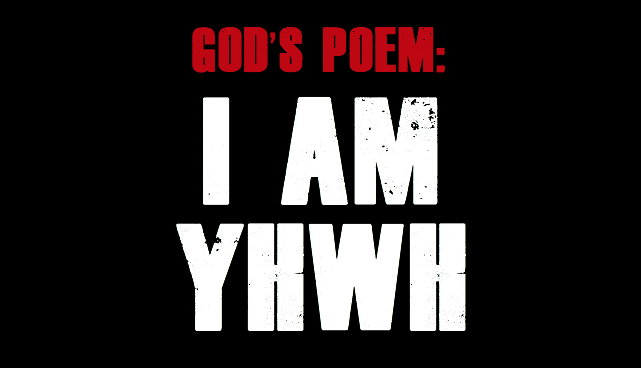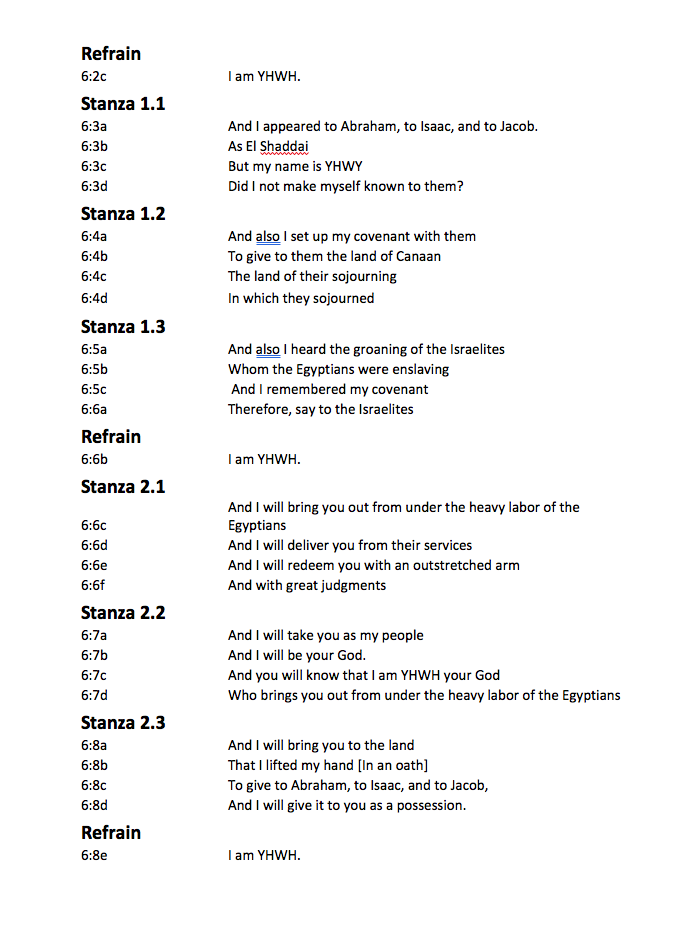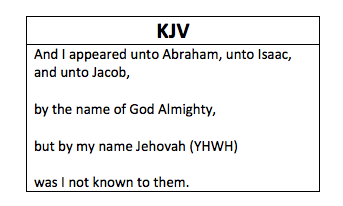The Main Point:
The structure of the poem teaches three main points. First, the overarching them that connects the poem together is expressed in the refrains: I am YHWH. Whatever the message of the poem may include, it must be understood to be an explanation of who YHWH is. YHWH is YHWH.
The Points of the Stanzas:
The division of the poem into two stanzas suggests that the theme “I am YHWH” falls into two major categories or explanations. By examining each stanza it becomes apparent that the theme of the first stanza is God’s faithfulness throughout history, while the theme of the second stanza is God’s future salvation. God sets forth His previous faithfulness to prove to Israel that He is worthy of her trust and will deliver her.
The Point of the Strophes:
The further division of each stanza into three strophes means that each of the arguments presented stanzas 1 and 2 consists of three parts. In the first stanza God argues that He is the same YHWH the patriarchs knew and trusted, He is the same YHWH who made covenants with the patriarchs, and He is the YHWH who knows all things. The second stanza promises to Bring Israel out of bondage, to make her a nation, and to give her the land of promise, thus fulfilling the covenant that He as YHWH made with Israel’s forefathers.
Parallelism:
Throughout the poem the attentive reader will notice a frequent use of parallelism. There are three basic forms a parallel structure in Hebrew poetry:
Structure #1: AA, BB (direct)
Structure #2: AB, AB (step)
Structure #3: AB, BA (chiasm)
Consider Stanza 1.2:
Stanza 1.2
6:4a
And also I set up my covenant with them
6:4b
To give to them the land of Canaan
6:4c
The land of their sojourning
6:4d
In which they sojourned
Here we have an AA,BB structure. The first two lines parallel each other, as do the last two. Together the strophe declares two points: God remembers the covenant He made, and he realizes that He has not yet fulfilled it.
Stanza 1.3
6:5a
And also I heard the groaning of the Israelites
6:5b
Whom the Egyptians were enslaving
6:5c
And I remembered my covenant
6:6a
Therefore, say to the Israelites
Here again we have an AA, BB construction. Why is Israel groaning? Because Egypt is enslaving. Why must Moses declare that God is YHWH to Israel? Because He remembers the covenant; He has not forgotten.
Point: Israel’s slavery does not mean YHWH has forsaken the covenant. YHWH hears, He sees, He remembers, and He sends Israel a prophet. If Israel hopes to receive salvation, she had better listen to the prophet God has sent.
Stanza 2.1
6:6c
And I will bring you out from under the heavy labor of the Egyptians
6:6d
And I will deliver you from their services
6:6e
And I will redeem you with an outstretched arm
6:6f
And with great judgments
We have another AA,BB construction. What does it mean to be brought out from under the heavy labor of the Egyptians? It means to be delivered from their services – not merely to have the load lightened.
What does it mean that Israel will be redeemed with an outstretched arm? It means that God is going to rain down judgment upon Egypt. Together the two parts are arguing: God is not merely going to release Israel from Egypt; he is going to release Israel by destroying Egypt.
Stanza 2.2
6:7a
And I will take you as my people
6:7b
And I will be your God.
6:7c
And you will know that I am YHWH your God
6:7d
Who brings you out from under the heavy labor of the Egyptians
Once more, we have an AA,BB construction. What does it mean to have God claim you as His own? It means that He will be your God and your God alone. How will they know that He is theirs and they are His? They will know it when He has brought about the Exodus. This strophe declares that the Exodus is about more than mere deliverance; it is about the establishment of a unique relationship between God and the nation of Israel; it speaks of a theocracy.
Stanza 2.3
6:8a
And I will bring you to the land
6:8b
That I lifted my hand [In an oath]
6:8c
To give to Abraham, to Isaac, and to Jacob,
6:8d
And I will give it to you as a possession.
Here we have an AB,BA or chiastic construction. What does it mean to bring Israel to the promised land? It means to give her the promised land as her possession. Why would he give her the promised land? Because He took an oath by making a covenant with Abraham, Isaac, and Jacob.
Here are three points to take away the poetic analysis we have just performed:
- If you miss the fact that this is a poem, you will miss the point of the passage.
- If you miss the structure of the poem, you will miss the God intended meaning.
- If you miss the parallelism, you will miss God’s own explanation.
These points, along with the ananalysis we have provided are important to keep in mind when we come to Exodus 6:3 because of the difficulty it presents to interpreters. The King James Version renders the passage:
In order to answer this difficult question, we must consider the purpose, structure, and translation of the passage.
Exodus 6:3 is the first strophe in the first stanza of the poem about YHWH. Thus we know two things: 1- The poem as a whole is about who YHWH was, is, and ever will be. 2- Verse 3 appears as part of the argument for God’s faithfulness through history.
Question: Why would YHWH argue that He is the same YHWH that has always been while at the same time arguing that the patriarchs had only ever known God Almighty and never YHWH?
That doesn’t make sense and I believe the problem can be cleared up when translation alternatives are considered. I believe the translation Duane A. Garrett’s provides in his commentary on the Book of Exodus is helpful and solves the problem.
- The first recognizable difference between the two translations is found in the third line where the KJV translates וּשְׁמִ֣י (ū·šə·mî) as “by My name” rather than literally as Garrett renders it “My name is”.
- The second difference is that Garrett translates the final line as a question, rather than as a statement (both are valid translations). Since Hebrew does not contain punctuation, the punctuation must be supplied by English translators.
The strength of Garrett’s translation is that the fourth line now parallels the first line, and the parallel statements harmonize with each other and Scripture as a whole rather than presenting a contradiction. Since parallelism is a normal component of Hebrew poetry, there is much to be said for Garrett’s translation.
Based on Garrett’s translation, rather than arguing that the name YHWH was never known by the patriarchs, the passage reminds Moses (and Israel) of God’s formal name and its connection to the covenant promises of the Old Testament. Though God was known on occasions as El Shaddai (the Mighty One), His primary name has always been YHWH, the God who was, is, and always will be (Exodus 3:14). This argument is supported by the fact that the name YHWH appears over 170 time in the Book of Genesis.
First, Bible readers are challenged to pay careful attention to the structure of Scripture for therein lies part of its meaning.
Second, God's people are challenged to believe in Him and His provision for their lives based on His flawless track record. God is still the same God He has always been. YHWH is YHWH. God knows all things, sees all things, hears all things, and remembers the covenants He makes. If God was faithful to the covenant He made with Abraham, Isaac, Jacob, and Israel, will He not also be faithful to the covenant He made with His Son?
Third, when God's people face difficult times, they need to remember the message God gave to Moses. What God has accomplished is sufficient for faith. Faith does not require a miracle around every corner, but rather a revelation of God's Word. Since the Word of God is complete (1 Corinthians 13:10, Jude 3) and since it thoroughly equips the child of God unto every good work (2 Timothy 3:16-17), may we look to the Word for faith and strength in difficult times.
Lastly, our role is not to question God; our role is to obey His word. It's time God's people started demonstrating their faith in God through action (James 2:18, 24) and not merely in word (Matthew 7:21-23).
I hope the discussion provided in this article has helped to clear up a difficult Bible passage, provoked our readers to further study, and shed some light on the nature of Hebrew poetry. May God continue to bless His children, and may the children look to Him for the way of escape.







 RSS Feed
RSS Feed
